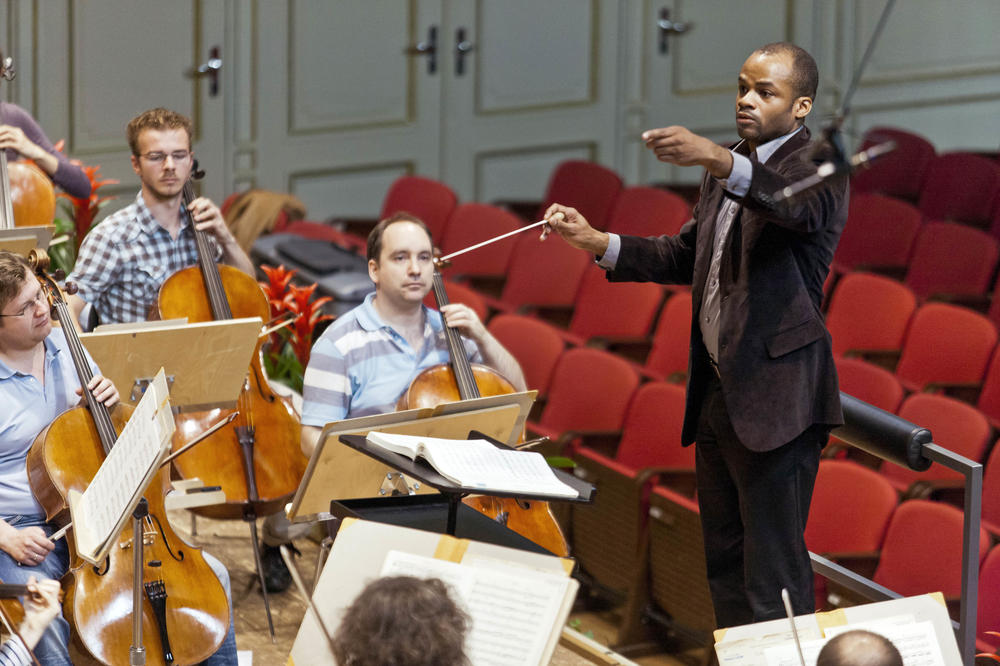Music in the Eyes of the Beholder
Brandon Keith Brown wants to overcome racist structures in classical music. An American conductor and visiting professor at the John F. Kennedy Institute, he is holding a seminar “Race and Music” with historian Jessica Gienow-Hecht.
Aug 02, 2021
Committed to people of color in classical music: The photo shows Brandon Keith Brown in rehearsal at the Tonhalle concert hall in Zurich in 2012.
Image Credit: Tonhalle-Orchester Zürich
Music is color-blind: it is not affected by the appearance of the people who perform it or listen to it. Music knows how to reach people’s hearts; it knows no skin colors. Or does it? Brandon Keith Brown has made a career as a conductor because of his talent. And despite the color of his skin. Because Mr. Brown is Black, but classical music is White.
Brown describes it like this: Classical music is “a tonal space of Whiteness.” What he means is: Classical music still consists almost exclusively of White musicians playing the music of White compositions for a White audience. Brown wants to change that. Even if many in the world of classical music do not want to.
Brandon Keith Brown Knew Early On: He Cannot Live without Music
Brandon Keith Brown was born in 1981 and grew up in North Carolina. He began composing at the age of nine and playing the violin at the age of ten. He says that he knew early on that music would play a major role in his life, that he wanted to become a musician and later a conductor. Brown first studied at the Peabody Institute in Baltimore, then with David Zinman (his principal teacher), Kurt Masur, and Lorin Maazel. In 2012 he won third prize at the International Sir Georg Solti International Conductors’ Competition held in Germany. Because he was then offered performances in Europe, but rarely in the USA, he moved to Germany.
Today Brandon Keith Brown is one of just a handful of Black conductors. Yes, there was Dean Dixon, who was appointed chief conductor of the Hessischer Rundfunk Symphony Orchestra in Frankfurt am Main as early as 1961. And yes, there is Kevin John Edusei, who has been chief conductor of the Munich Symphony Orchestra since 2014. But in most orchestras it is still completely unusual for a Black conductor to be hired. Brown works as a conductor with guest appearances worldwide. He conducts Wagner, Bruckner, and Mozart as well as American compositions.
Jessica Gienow-Hecht and Brandon Keith Brown are leading a seminar on “Race and Music.”
Image Credit: Personal collection
Brown also teaches at universities. Currently he is at Freie Universität, where he is holding a seminar on “Race and Music” along with Jessica Gienow-Hecht, head of the History Department at the John F. Kennedy Institute for North American Studies.
Historian Gienow-Hecht is specialized in music and politics. For many years she has dealt with the importance of symphony orchestras in international relations since 1850, and she is currently working on a project on music and human rights. She says, “Classical music is not only NOT color-blind, it is also gender-specific. Black and female musicians have been discriminated against in this area for decades.”
Changing Society from the Podium
Brown describes himself as an “activist.” His goal is to help change society from the podium. If the world of classical music is so homogeneous, if there are so few Black musicians or conductors in it, then it seems obvious: There can be no other plausible reason for this than invisible barriers, different forms of discrimination, unequal promotion, and structural racism. Yet, this idea probably hurts most fans of classical music. It is also true: when you see and hear how Brown conducts Mendelssohn, Mozart, or Sibelius, the moment the music begins, its magic unfolds. It is inconceivable to imagine that these people who are here together, making music together, could harbor racist prejudices about one another.
Brown points out that the situation is not that simple. When he speaks of racism, he does not mean a single act, insult, or assault, but rather, following Robin Di Angelo’s definition, a “group prejudice backed by institutional power.” It is the mechanisms that decide which group is in or out, whose tradition is to be upheld and whose not.
Basically, says Brown, the question of racism and classical music is “about White supremacy.” He continues, “It is about the decision-making power in the orchestras, control over the repertoire, the selection of artists, the use of the funds. Classical music is a White, Western, European tradition. If you find yourself outside of this tradition, if you do not belong, then you are perceived as someone who is lacking competence. Within this tradition, your value if you are not White is lower.”
Poor Cards in the World of Classical Music based on Skin Color
Brandon Keith Brown says the first time he experienced this firsthand occurred when he accepted a position as a Visiting Professor at Brown University in the United States. “It started when people told me that I was hired because I was Black.” Working with his colleagues was difficult from the beginning. Brown was the first full-time Black professor on the faculty.
For Brown, it was even more difficult to conduct a completely White/Asian orchestra. Some members of the orchestra announced even before their first meeting with Brown that they were afraid of him. He says, “That was the first time that I understood: I am Black first before I’m a conductor. No matter how hard I try, how hard I work, the color of my skin will always be seen first in the world of classical music.”
If it comes down to power, why is the position of the conductor particularly contested? Presumably the conductor is the most powerful person in the orchestra, the one who sets the pace. “Well,” says Brown, “the conductor himself is mute; he doesn’t make any sound.” Rather, the conductor is dependent on the fact that his silent influence on the musicians awakens a desire in them to produce the very notes that the conductor has in mind. “The conductor is only as powerful as the orchestra permits,” says Brown.
Brown himself has almost only had good experiences working with orchestras, and so far he has only felt strong hostility and rejection from one German orchestra. In order to contribute to a change in the balance of power in the classical music business, he has set up a foundation, the All The Black Dots Foundation. It aims to support musicians who belong to underrepresented minorities.
Music Itself Is Color-blind
The question remains whether those involved in classical music want to hear Brown’s criticism and join the debate about racism and music. “No, they don’t want to,” says Brown. “They do not join this debate voluntarily, but only because they can no longer avoid it.” Many orchestra conductors, music managers, and agents find the discussion very unpleasant.
Music itself is color-blind. Even so, the world of classical music is perhaps the area that is changing the slowest in terms of equality. “Classical music is essentially about preserving a White, Western canon,” says Brandon Keith Brown. It is time to open up this world and make it more permeable.
This text originally appeared in German on July 3, 2021, in the Tagesspiegel newspaper supplement published by Freie Universität Berlin.
Further Information
About the Seminar “Race and Music”
Maestro Brandon Keith Brown is teaching the seminar “Race and Music” with historian Professor Jessica Gienow-Hecht in the 2021 summer semester at the John F. Kennedy Institute for North American Studies at Freie Universität Berlin. Together with the students, they are examining the relationship between music, race, and ethnicity in North America, with a focus on classical music, but also on popular music.
Based on the works of African-American musicians of the classical period and the present, the seminar deals with issues relating to (pre-)power, oppression, and exclusion in the composition, performance, and consumption of music.
How is it that music sometimes acts as an instrument of power, sometimes as a tool of emancipation? How does music interact with identity, discrimination, political action, oppression, and liberation?


